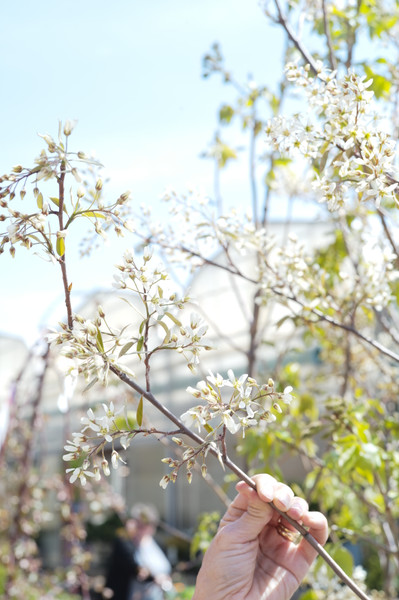Serviceberry
Posted by Jessie Jacobson on May 12th 2024
Amelanchier (Serviceberry)
Attractive to birds while adding three-season interest to the garden Amelanchier, commonly known as Serviceberry or Juneberry, never fails to delight. This member of the rose family, Rosaceae, captivates with fragrant flowers in the spring followed by delicious berries in late May or early June and stunning hues of yellows and oranges in the fall.
Serviceberry is available in both a tree form, Amelanchier x grandiflora or 'Autumn Brilliance' and a more compact shrub form with multi-stems, Amelanchier alnifolia ‘Regent’. Both varieties prefer full sun and a well-draining, loamy soil though they can tolerate sand and clay. Root suckers are common, and if not removed, will result in a shrubby growth habit for the plant. Overall pests and diseases are not a major problem with serviceberries, you may need to watch for powdery mildew, rust, and fire blight.
Regent Serviceberry matures to 6 ft tall by 8 ft wide with a compact, rounded growth habit. Because of its smaller stature, it makes a great hedge or border plant. Leaves are oval, deep green, and finely saw-toothed. Spring brings small, white, aromatic flowers that pollinators and passersby find irresistible. The flowers quickly turn into bluish-purple edible berries that can either be eaten plain or made into jams, jellies, or pies. If you want to enjoy the berries, you need to act quickly as they are also a favorite of birds and small mammals. In the fall, enjoy the stunning, harvest-yellow leaf color.
Autumn Brilliance Serviceberry grows 25 ft tall and 15 ft wide. In April, clusters of 5-petaled, white, sweet-smelling flowers emerge followed by purple edible berries that are prized by birds. Autumn Brilliance has brilliant orange-red fall color owning true to its name. While Autumn Brilliance is not a true Minnesota Native tree, it is a cross between two native cultivars, the Downy Serviceberry and the Allegheny Serviceberry making it a wonderful addition to homeowners’ yards.
Happy planting and see you at Tonkadale!

